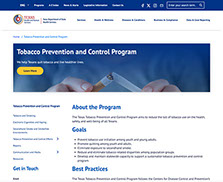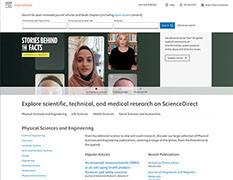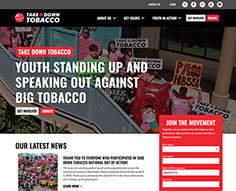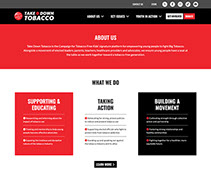
Module 1:
Knowledge: The Foundation of an Advocate
No matter your age or level of experience supporting a cause, advocacy is for all. However, where do you start? How does one become an advocate? How do you decide what to advocate for? All those questions can be daunting, but the foundation of a good advocate starts with understanding advocacy and increasing one’s knowledge about a cause. Below is a breakdown of beginner steps and important actions to take.
What is Advocacy?
Advocacy is about doing something to support, recommend, or implement actions linked to an idea or cause that you care about. Also, advocacy has different forms of implementation.
Self Advocacy: When someone advocates for their own interests. It involves skills like knowing your rights, understanding your needs, and communicating those to others. This could look like having a conversation with a friend or family member about tobacco prevention and why you believe in it.
Individual Advocacy: Is when a person or group focuses on the interests of one or a few individuals. It can be informal or formal. A good example of informal advocacy could look like you standing up for a friend’s needs or wants when they are being treated unwell. While formal advocacy would be yours or your youth group’s efforts at increasing awareness about the dangers of vaping and using other commercialized tobacco products.
Systems Advocacy: Seeks to make changes at local, state, and national levels through laws and/or policies. An example of systems advocacy could be passing a smoke-free ordinance or smoke-free parks policy for your city.
A good example of an advocacy movement is the Say What! program, which includes thousands of Texas youth and adults who host educational and awareness projects to keep their community’s nicotine and vape-free. Here’s an example of a middle school Say What! group educating their county commissioner’s court:
1
2
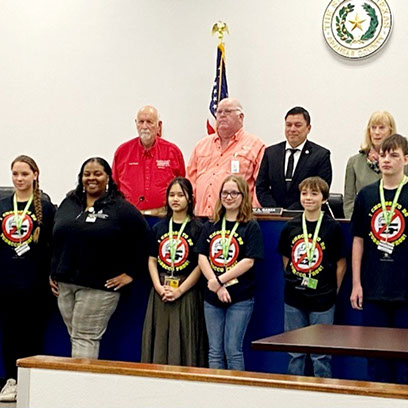
Say What! Members presenting at Aransas County Commissioners Court
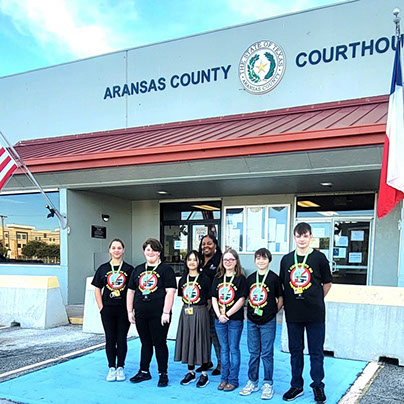
Say What! Members presenting at Aransas County Commissioners Court
Why Advocate?
All over the world people advocate for specific causes because they want to see change for the better. The most powerful tool an advocate has is their voice because it enables people to be heard and for people to better understand each other. Without advocacy, many voices would remain silent. Throughout history, we’ve seen advocates who have dedicated their lives to serving as the voice for others to help create change for the better:

Dr. Martin Luther King
“I have a dream that my four little children will one day live in a nation where they will not be judged by the color of their skin but by the content of their character.”

Mahatma Gandhi
“I object to violence because when it appears to do good, the good is only temporary; the evil it does is permanent.”

President John F. Kennedy
"And so, my fellow Americans, ask not what your country can do for you, ask what you can do for your country.”

Rosa Parks
“I try to have as little anger as possible. I try to use it to help people who were suffering and many who were discouraged and did not have the courage to try to take a stand for themselves.”
As far as tobacco prevention, maybe you have too many vape shops within your community, or you know several who sell to those under 21 years of age. Maybe the reason why you advocate or want to advocate is because you know someone who suffers from tobacco-related health issues. Whatever your motivation, finding your voice and perfecting your advocacy skills can be the catalyst to create the change you are looking for.
What is Policy Advocacy
Sometimes, advocacy can involve changing policies in your school, city, or state. When advocating for a change in a policy, it’s important to ask yourself if the current policies are working or if advocating for new policies would improve your community. Advocating for policy change, also known as policy advocacy, can occur at the local, state, and national levels.
Local Policy: Includes school boards and administrators, city council members, sheriff, and Mayor. These individuals create and implement laws for your local community.
State Policy: Think of this level like our state of Texas. There are certain laws and regulations in place that were developed, elected, and voted on which impact our state. At this level, policy makers include senators, representatives, and a governor.
National Policy: Refers to the governing laws, regulations, and policies implemented by our nation. Individuals who represent and work in this level of policy include US Senators and Representatives, Vice President, and President.
Local Policy
State Policy
National Policy
How to be an Advocate?
To be an advocate there are certain skills that are important to build and should become natural with practice and effort.
1. Education
Advocacy requires educating yourself, so you know what you’re talking about. Advocates rely on reliable facts, current trends, and topics to support their cause. Tobacco awareness and prevention advocates should gather information that is research based or from a reliable source. For example, collecting published information, searching through journal articles, or visiting official websites.
There are so many opinions and storytellers on the internet, so how do you know which sites and publications are “good sources.” In this activity you will learn tips and what to look for, so you don’t accidentally share false information:
True or False 1
Websites ending in “.edu” are educational and usually safe resources.
Answer
Answer: True
Websites ending with “.edu” are normally connected with educational institutions like universities and schools. These sites are reliable because they are backed by academic professionals and are research based.
True or False 2
Government websites ending in “.gov” are not reliable resources.
Answer
Answer: False
Typically, sites ending in ".gov” are run by governmental agencies. These sites provide information about policies, statistics, and public services, because they are government-controlled they are reliable and trustworthy.
True or False 3
Library resources, including books and magazines, are reliable to use.
Answer
Answer: True
Library resources like books and magazines must go through fact-checking before they are published. Libraries develop and provide reliable collections that are excellent sources for information.
True or False 4
Websites ending in “.org” are typically managed by nonprofit organizations and can serve as valuable resources.
Answer
Answer: False
These sites typically focus on specific issues, causes, or community services. However, it's important to check the credibility of the organization to ensure the information is unbiased and accurate.
True or False 5
Commercial websites ending in “.com” may contain bias information due to advertising aimed at selling products.
Answer
Answer: True
These are commercial sites and have content influenced by advertising and marketing goals. Some sites may have biased information aimed at selling products or services.
2. Communication
Using your voice is important as an advocate. How you choose to spread awareness varies. You can speak with community members, local businesses, or local governmental leaders. You can advocate on your own or you can join organizations. If you are interested in finding out more about using your voice, and getting connected on a larger scale, these programs can help.
3. Taking Action
Spreading awareness is an important step in advocacy work. Adults and youth can make change with the efforts they put in by sharing facts and words of encouragement to prevent use and empower those who do use to quit. This may look like participating in rallies, writing to local officials, or posting against Big Tobacco on your social media. We will cover more of these actions in our next module. For now, identifying how you would like to engage and take action is the first step.
Think about your qualities, strengths, growth areas, and what you feel comfortable doing. Your advocacy skills evolve as you grow and become more comfortable and confident speaking out.
There are two ways to practice advocacy: active and supportive. Both forms are impactful and can create significant change in your school and/or community. But, what’s the difference?
● Active Advocacy means you are actively using your voice to increase awareness. Examples of active advocacy could be hosting rallies or projects in your school or community.
● Supportive Advocacy involves helping a cause without necessarily taking direct action. This type of participation is more passive, such as attending anti-tobacco events to listen to a speaker or sharing a post on social media. You engage by offering support rather than by organizing or leading events
You have the option to choose one, the other, or both when it comes to advocacy and influencing change. The approach you take is up to you. To be an effective advocate, whether actively or in a supporting role, it’s important to understand your personal qualities.
By completing the Strengths Exploration activity, you can gain insight into your personality and identify the strengths that will help you become a successful advocate and make a meaningful impact.
4. Motivating Others
As an advocate, you’re not only trying to empower your friends and peers to live tobacco, nicotine, and vape-free, but to motivate others. Advocacy can motivate others to quit using tobacco products, encourage elected officials to change policies, and inspire others to join your efforts. Here are a few resources created by Say What! that you can use to help motivate others.
Sources for module 1 include Human Rights Careers, Voices of Youth, Therapist aid, and Kids Health.
Training Module
Modules
Home
Say What! EST. 2011
Phone
512.245.8082
Mailing Address
Texas School Safety Center
ATTN: Say What Program
Texas State University
601 University Drive
San Marcos, TX 78666

Say What! was created and designed by young people from across Texas and connects students interested in eliminating tobacco from their schools and communities. The Say What! movement is funded by the Texas Department of State Health Services through a contract with the Texas School Safety Center at Texas State University.

